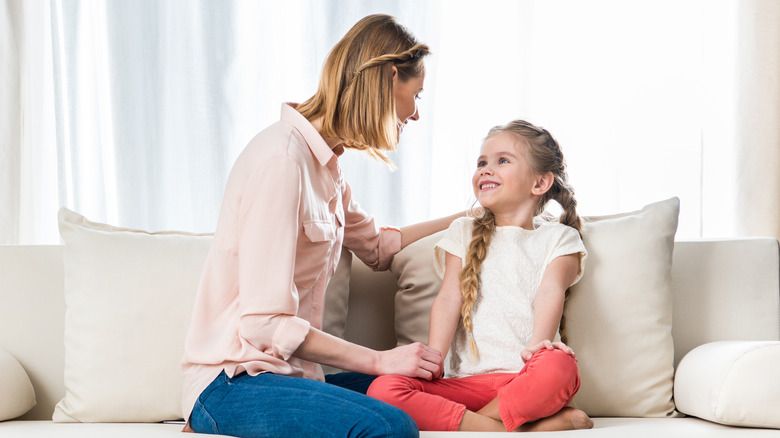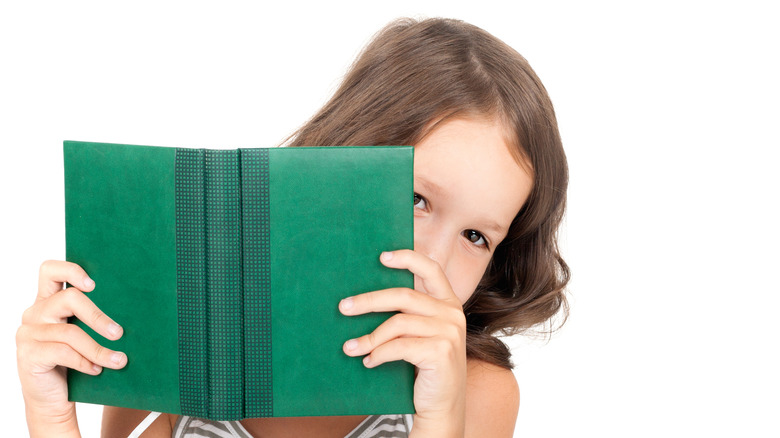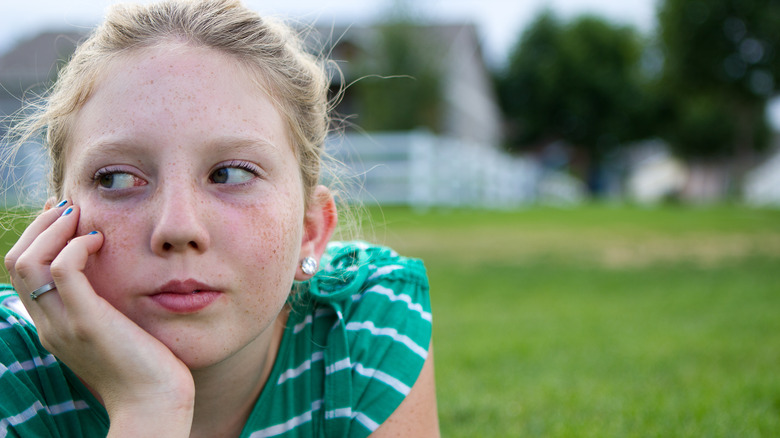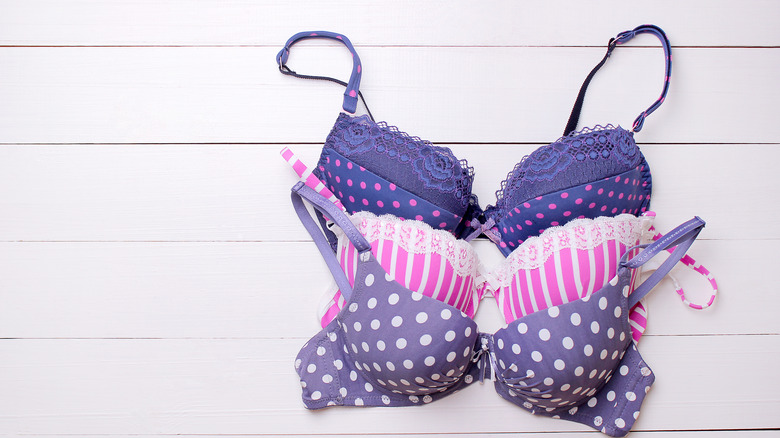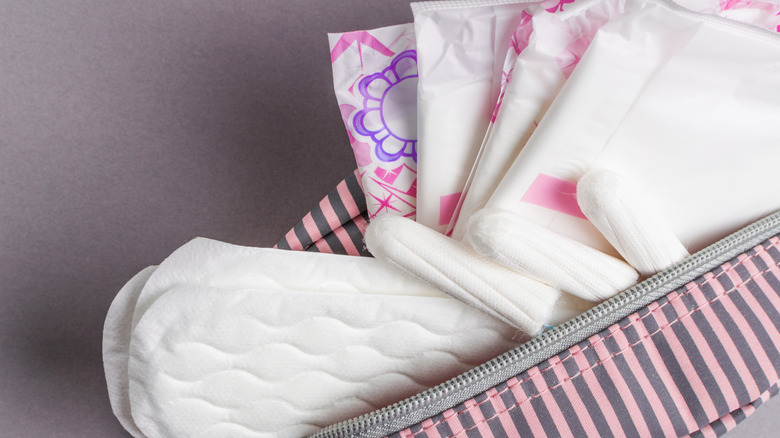Everything Your Daughter Should Know Before She Gets Her Period
What was your first period like? Were you expecting it? Shocked? Were you excited? Scared? Grossed-out? Proud? Did you hide it? Tell the world? Shove toilet paper in your pants and cry in the middle school bathroom? Did you celebrate with your family? Girls in the United States (not to mention all across the world) have first period stories that run the gamut from grandiose to grisly. Even in our modern culture of constant public sharing, menstruation is still considered a distasteful topic — something embarrassing to be dealt with in private.
Wouldn't you like to change the stigma surrounding menstruation, and help girls around the world feel confident and prepared to go through puberty? Well, knowledge is power, ladies! And your contribution to the cause starts with your own daughter. The best way to teach her to love and respect her own body as she moves toward puberty is to be prepared. So in addition to consulting myriad public health guides, I spoke with Dr. Sherry Ross, an award-winning OBGYN, women's health expert, author, entrepreneur, about the best way to empower your daughter, and to prepare her for the inevitable anatomically-female experience: getting her period. So here, concerned ladies, is a quick and dirty (though, highly empowering) list of what to cover with your daughter before she gets her first period.
Periods are normal
Even though it may seem gross or weird or scary to the pre-puberty set, remind your daughter that pretty much every adult woman she knows went through puberty, and lived through it. Dr. Ross recommends beginning "by sharing your [own] experiences, especially your own personal fears, as your body changed with puberty." Humanizing menstruation by making it a concrete, personal topic can help remove fear. "You can say, 'I was so scared to get my period, worried about the bleeding, cramps and how I would keep the blood from not messing up my panties,'" says Dr. Ross. She recommends giving an example, like, "I remember carrying Kotex pads in my backpack just in case I got my period during my English class!" Talking about your own experiences first will help normalize menstruation, and help your daughter realize it's okay to talk about her feelings regarding puberty.
She can be prepared by knowing it's coming
Your daughter should know what the signs and symptoms of puberty are before they happen to her, so she doesn't need to feel anxiety about whether she or her body are "normal." That means communicating with your daughter about puberty — ideally way before you think it's time. Dr. Ross says, "today, on average, a girl will get her first period at 12-years old, however, puberty, in all its glory, may start as early as eight-years-old." So don't wait until it's already happening to her to bring up the subject.
The Mayo Clinic recommends talking with your daughter about puberty early: "Don't plan a single tell-all discussion. Instead, talk about the various issues — from basic hygiene to fear of the unknown — in a series of conversations. If your daughter asks questions about menstruation, answer them openly and honestly." They also remind parents that if your teen or tween is "...not asking questions as she approaches the preteen years, it's up to you to start talking about menstruation." Dr Ross advises, "It's important to slowly and comfortably ease your daughter into talking about her body and changes associated with puberty before her first period occurs."
Some usual signs of puberty
Web MD lists signs like "increased hair," "a growth spurt," and "mood swings," all signal impending puberty for girls. There are lots of hormonal changes to look forward to (or dread). We're talking body odor, breasts, hips, sexual thoughts and feelings and more. "Breast buds are noticeable two years before the period actually starts and can be detected between eight to 13 years old," says Dr. Ross. "Pubic hair, hair under arms and legs, and acne also join the hormonal party during the tween years."
When to expect what
The fact that girls can start their periods anytime within such wide age-range can be frustrating for young women as they don't know when to expect what. For instance, although the average age of first menstruation is 12, according to both Dr. Ross and Kidshealth.org, it could start as early as age eight, or as late as age 15.
Although every person is different, puberty in females tends to follow a general sort of arc, wrote Dr. Karen Sarpolis in an article for ObGyn.net. So if your daughter is feeling stressed about the whole not-knowing aspect of when her period will strike, you can help her predict things by looking at her other symptoms. According to Dr. Sarpolis, "The two things that are most closely tied to the age when a girl starts her periods that she can readily assess herself are [when she needs her] first real bra and [when she gets] armpit hair... At this point, a girl will probably start her period within three to six months, if she hasn't already."
What products can she choose from?
If she knows how to deal with her period when it does arrive, your daughter will feel prepared instead of scared. Trot out some of the products you use, and talk about each one. Show her how to put a maxi pad in a pair of undies (don't forget the wings!). Show her products like tampons with and without applicator, and even eco-friendly options like a menstrual cup. That said, be sure to tell her that one isn't better than the other, and that she gets to choose which one makes her the most comfortable to use.
As Angela Oswalt, MSW wrote for mentalhelp.net, "Some younger girls may feel uncomfortable about inserting a tampon into their bodies. Generally, younger adolescents should start by using pads, rather than tampons, in order to become familiar with measuring and monitoring their flow, and to develop the habit of regularly checking and changing hygiene supplies." Let your daughter know that she can work up to using tampons if she wants to, but that she can get to know her body first. Support her by giving her some products to keep in her room or locker, and she can feel empowered to deal with her flow whenever it may come.
What about hygiene?
Be warned: Dr. Ross told me in our interview, "Your daughter may be completely unwilling and uninterested in having a conversation involving her breasts and vagina, let alone talking about her period...", in which case, talking about hygiene won't be possible just yet. It's important to be respectful during conversations like these, which can feel awkward and personal to your daughter.
Dr. Ross suggests, "If she is not ready, you can always say, 'I am always here for you if you want to know more about puberty and the changes that will be happening to your body.'" Asking open-ended questions (like 'how are you feeling about all this?') is also a good way to open up the lines of communication.
Once your daughter is ready to talk, you'll want to include a bit of hygiene information into your conversation, but approach the topic with sensitivity. For instance, if you're talking about new body hair that can appear in her armpits, and on her legs and vagina as a normal part of puberty, Dr. Ross told me you can use that as an opening to talk about how to properly clean the vagina. Dr. Ross suggests buying "intimate non-fragrant soaps... that won't cause infections or dryness." You can also talk to her about deodorant and special facial soaps for acne. Cater the conversation to what your daughter is going through.
Periods are not as scary as they can seem
Childhood urban legends are rife with horror stories, and lack of knowledge is what tends to fuel those scary tales. Public school health classes teach some of the general info, but not everyone gets those lesson plans, and some girls may have already started puberty before health class becomes part of the curriculum. Plus, these lessons tend to only teach the physiology, and don't generally prepare girls for how they might feel about these body transitions.
So remove the smoke and mirrors and tell her the truth: yes, you are going to have a bit of blood coming through your vagina for a few days every month, but it's not because you're hurt! In fact, it often signifies that things are healthy with your reproductive system. Ask her how she feels about it, and let her know there's no right or wrong way to feel about the complex process of puberty.
Model self-empowerment for her
Even if all this seems weird, gross, nasty or scary to your daughter, you can help set a positive tone by modeling self-empowerment for her. Dr. Ross mentioned in our interview that you can "promote body confidence, not fear" by having these tough conversations in a frank and unembarrassed way. She especially recommends using "the correct descriptive terms when talking about her breasts, vagina, and period," even if she giggles or groans! "If young girls and women are not able to confidently own the proper words to describe their female body parts," says Dr. Ross, "it makes it difficult to comfortably talk about their personal needs and experiences, both now and throughout her adulthood." If you are unashamed, your daughter will hopefully copy your attitude!
Above all, she'll still be herself
Tell your little lady to listen up. Getting her period doesn't mean she has to suddenly become "a woman now." Getting your period means your body is growing up and becoming capable of reproducing, but that doesn't mean you are expected to be ready for those things! Puberty is a slow process, and waking up with spotting on your undies doesn't mean you will suddenly feel like a woman. Menstruating doesn't mean your childhood is over!
Young girls often know much more about sexuality and what their bodies mean to others than what it means to own them and live inside them. Remind your daughter that having a period is her own journey, and just one part of growing up. And, of course, even if others start to treat her differently as her body develops, she gets to take as long as she wants to feel grown up on the inside.
For more helpful resources on talking to your daughter about her body and how to live her best life as a girl and young woman, check out this incredible self-empowering book list put together by the folks at the A Mighty Girl blog.
